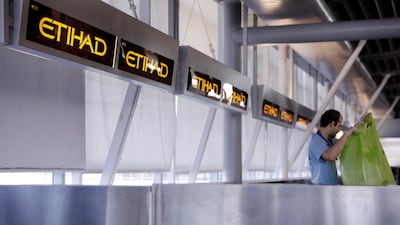A terrorist who plotted to blow up an Etihad Airways flight from Sydney to Abu Dhabi by hiding explosives in a meat grinder was caught because of the luggage being too heavy, a court has heard.
Check-in staff thwarted the bombing, saving the lives of 400 passengers on board, after refusing to process the suitcase as it was over the weight allowance.
Extremist Khaled Khayat had hidden the bomb in his brother’s luggage without his knowledge in a bid to smuggle it on to the plane.
On opening the package, officials at Sydney Airport discovered the meat grinder inside.
The device never made it past airport security.
Police conducted a series of raids throughout Sydney and Khayat and a different brother called Mahmoud, both Australian-Lebanese nationals, were arrested weeks later.
It was then discovered he was planning a further atrocity involving a chemical gas attack at the behest of ISIS.
Police believe he had been in contact with ISIS in the three months leading up to the attempted bombing in July 2017.
They believe ISIS then sent him the high-grade military explosives found in the crude bomb through air cargo from Turkey.
On Wednesday, a court in Australia convicted Khayat, 51, for his role in the attempted attack
He and his brother were accused of jointly planning both attacks under the orders of ISIS.
During his trial, he claimed a relative in Syria and an unknown man known as “the controller” gave him instructions on how to make the bomb and later sent him ingredients for a chemical attack.
It is believed the relative was a third brother, Tarek Khayat, an ISIS commander who was captured in Iraq earlier this year.
A jury convicted Khayat of his role in the plots and were still continuing deliberations over his brother, Mahmoud.
"The jury this afternoon returned a guilty verdict for Khaled and is still deliberating in respect of Mahmoud," a spokeswoman for the New South Wales Supreme Court said.
He was convicted of conspiring to carry out acts in preparation for a terrorist act and is due to be sentenced in July. The sentence carries a maximum sentence of life imprisonment.
His lawyer, Richard Pontella, had attempted to argue that his client had in fact been trying to prevent a terrorist attack.
But a jury rejected his argument after three days of deliberations.
Australia continues to remain on high terror alert.
Last November, Prime Minister Scott Morrison said the likelihood of a terror attack in Australia remained at the "probable" level.
It followed a fatal stabbing in Melbourne, which police claim was inspired by ISIS.
Australia has a five-level terror threat ranking system and "probable" is its midpoint. The threat likelihood has been set at probable since the system was introduced in 2015.
In December 2014, two hostages were killed in a cafe in Sydney during a 17-hour siege by a "lone wolf" gunman inspired by ISIS militants.

